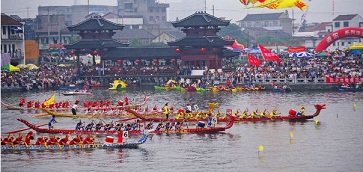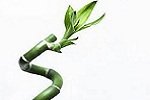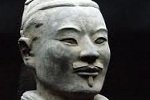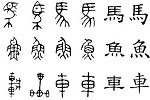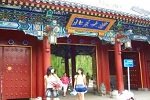Home ![]() Chinese Traditions and Culture
Chinese Traditions and Culture ![]() Qi Qiao, Qi Xi
Qi Qiao, Qi Xi
Double Seven:
the Chinese Valentine's Day
The Double Seven (or Qi Qiao Jie) Festival is one of the most romantic traditional festivals in China. Its most popular Chinese name is Qi Xi, which literally means "The Night of Sevens."
It falls on the seventh day of the seventh lunar month on the Chinese calendar, and is also known as the Magpie Festival.
As the influence of the Western tradition increases in China in recent years and the Valentine's Day is known and celebrated by many, it is sometimes called the Chinese Valentine's Day due to it originating from the legend of the loyal love between Niulang (cowherd) and the immortal Zhinu (weaver girl).
Here is the story of Niulang and Zhinu, or The Cowherd and the Weaver Girl.
Double Seven Traditions vary in different parts of China. In general, they are better kept in small towns and villages than in big cities. The Cultural Revolution contributed to the loss of many traditions, and many local Chinese governments have been trying to revive China's traditional culture in recent years by sponsoring and encouraging local festivals and celebrating activities.
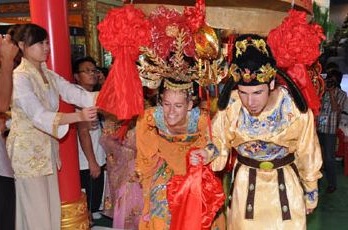 A Western couple were married in the traditional Chinese wedding style on Qi Xi in An Hui Province
A Western couple were married in the traditional Chinese wedding style on Qi Xi in An Hui Province
- In some areas of China, a festoon is placed in the family yard on Qi Xi and the single or newly married women in the household make an offering to Niulang and Zhinu. The offering usually consists of fruit, tea, flowers, and facial powder (makeup).
After finishing the offering, half of the facial powder is thrown on the roof and the other half divided among the young women. It is believed that by doing so the women are bound in beauty with Zhinu. 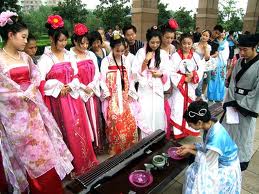 In ancient China, hand sewing was very important. Women often asked Zhinu to give them this skill on Double Seven. This is why Double Seven is also called by Chinese the "Festival to Plead for Skills."
In ancient China, hand sewing was very important. Women often asked Zhinu to give them this skill on Double Seven. This is why Double Seven is also called by Chinese the "Festival to Plead for Skills."
As time goes by, a tradition came into being that young girls throw a sewing needle into a bowl that is full of water on the night of Qi Xi to test their embroidery skills. If the needle floats on top of the water without sinking, it is believed that it is an indication of the girl’s superb embroidery skill.
- In Hunan and Zhejiang provinces, women wash their hair with river water or spring water on Qi Xi, believing that the water is sacred on that day as if it were fetched from the Milky Way (the Milky Way is called Silver River in Chinese). Washing with the sacred water would give them the protection and blessings from heaven.
They also gather dew in the Qi Xi morning because it's said that the dew is the tears of Zhinu and Niulang. When the dew is applied to the face and hands, it makes your eyes see well and your hands quicker at what you do.
- In some areas of Sichuan, Guizhou and Guangdong provinces, young girls often mix tree syrup with water to wash their hair. It is said that it may help them stay youthful and beautiful and will have a good husband.
They also use flowers to dye their nails. It's fun and helps have good luck in child bearing in the future. - In some villages in Shaoxing, Zhejiang, young girls hide in pumpkin fields to eavesdrop what the Niulang and Zhinu would say on Qi Xi. If they hear the couple's conversation, they'll have everlasting love and good fortune in their future marriage.
Do you have your Zhinu or Niulang in China? Get a Chinese Visa and air ticket to meet him or her. :)
Read the story of Niulang and Zhinu.
Other Important Traditional Chinese Holidays:
 Chinese New Year, or Spring Festival
Chinese New Year, or Spring Festival
The Chinese Spring Festival is the biggest holiday in China that lasts for 15 days, though workers normally have 3 days off. Here are more details.
Some people call it Pure and Bright Festival. Here are more details about this sad yet beautiful occasion.
A very auspicious day that is also called Height Ascending Day or Chongyang Festival.
The Chinese Mid-Autumn Festival falls on the 15th day of August every year according to Chinese Lunar calendar. To the Chinese people, its importance is second only to the Spring Festival.
It occurs on the fifth day of the fifth lunar month, fun, exciting and full of meanings.
Home ![]() Chinese Traditions and Culture
Chinese Traditions and Culture ![]() Double Seven
Double Seven

New York Pass With More than 50 Sttractions

Southern California CityPASS saves you 32% for Disneyland, Universal Studios and 3 other attractions
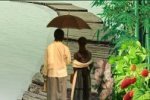
 Double Nine
Double Nine
